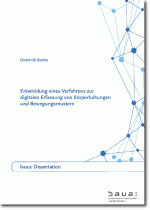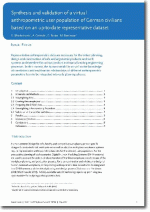Good planning is vital
The development of safe, healthy working conditions demands the careful design of products and work systems. The deployment of virtual design tools allows shortcomings to be identified at an early stage and ergonomic improvements implemented.

What is digital ergonomics?
Digital ergonomics is a generic term for the use of digital models and methodologies in the planning, realisation, and continuous improvement of products and sociotechnical work systems. In this discipline, everything revolves around the individual human being. They are the yardstick against which the product or system being designed is judged to make sure it is useable, safe, and healthy. One essential pillar of digital ergonomics is anthropometry. Apart from the acquisition of anthropometric data and the application of modern methods to process them, the possibilities for the virtual planning of individualised work are an important issue in this field. Its anthropometric aspects are complemented by motion and posture analyses conducted using sensor-supported technologies. Digital human models form the foundations for ergonomic work assessments informed by human biomechanics. Furthermore, digital ergonomics develops cognitive human models in order to investigate human cognitive processes, in other words how we perceive and understand the world around us.
Our research
Digital ergonomics involves the design and assessment of workplaces with new technologies. It requires anthropometric data in order to generate up-to-date design measures for products and work systems. Our research concentrates on the preparation and provision of fresh anthropometric datasets. When it comes to ergonomic work assessment, researchers are investigating the options for the deployment of modern sensor technologies that systematically capture and assess body postures. The hope is that this will make it possible to identify hazards, such as those posed by inappropriate loads in the workplace, at an early stage.
Methodological approaches
Digital ergonomics draws on diverse methods, both in the laboratory and in the field, to answer topical questions. Modern measurement techniques are utilised to gather data, and technologies' potential benefits are assessed. The measuring instruments used for these purposes include:
- 3D body scanners (which record anthropometric data)
- motion capture systems (camera or sensor-based)
- electromyographs (which record muscle activity)
- force sensors (which record external forces)


